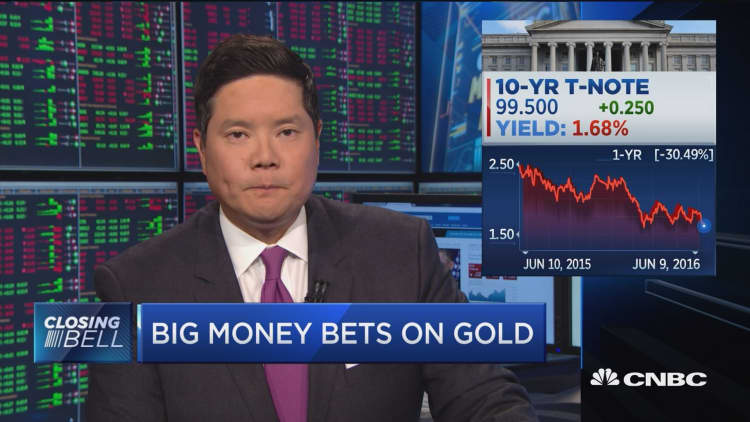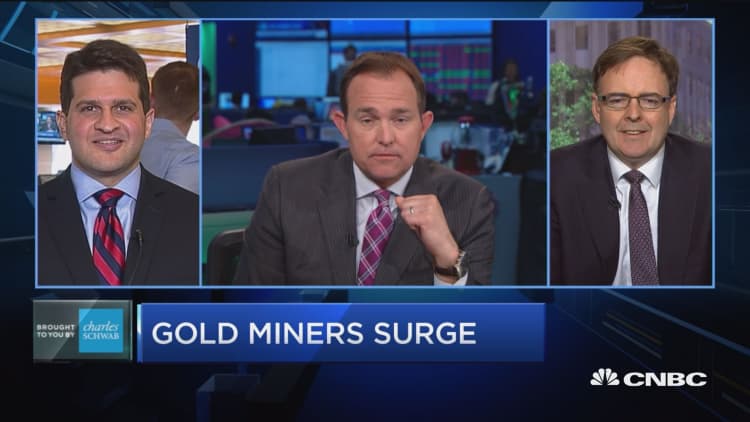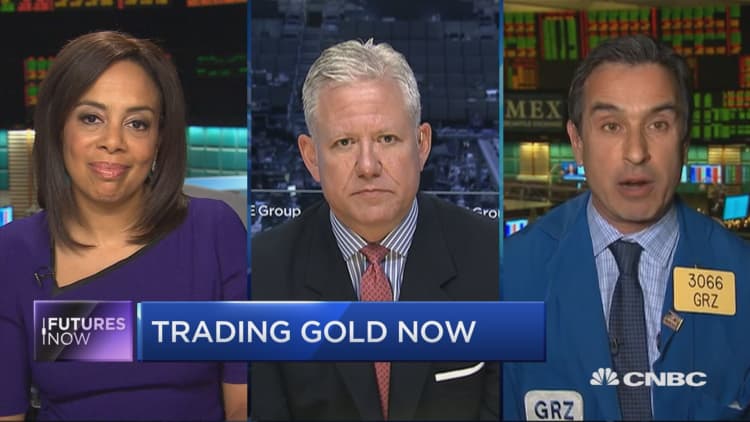


Gold prices would likely resume their bull run of earlier this year, ANZ said, as expectations for Fed rate hikes eased and the Brexit poll fueled risk aversion.
Spot gold prices have been trading flat at around $1,267 an ounce, after failing to decisively breach $1,300 an ounce in May, but in a note on Friday ANZ commodity strategist Daniel Hynes pointed to two elements that would likely give prices of the precious metal room to grow.
He noted comments this week from U.S. Federal Reserve Chair Janet Yellen that tamped down expectations of aggressive rate hikes this year, and as well as the expansionary, low or negative interest rate monetary policies being pursued in in Japan and Europe.
Gold prices gained more than 16 percent in the first four months of 2016 and tested the key $1,300 an ounce level in May but have since backtracked somewhat, mirroring market expectations for a Fed rate hike. Gold typically falls as interest rates rise because it is not an interest-yielding instrument.
Thirdly, risk aversion prompted by the Brexit vote — which Hynes called "a real watershed moment" for the precious metal — could push gold to $1,400 an ounce, he said.
The U.K. will hold a referendum on June 23 on whether to stay in or leave the European Union (EU), with opinion polls currently leaning very slightly toward the "stay" side.
"If the Leave campaign is successful, the expected collapse in the GBP and resultant market volatility would likely see investors seek safe haven assets," Hynes said.
ANZ's call comes as a number of high-profile investors turned to bearish bets, including billionaire investor George Soros, who recently bought gold and shares in gold miners, the Wall Street Journal reported Thursday.
The supportive factors should offset some lackluster physical gold demand from top buyers China and India, Hynes added. In particular, demand in the South Asian country has been hike by a hike in import duties and .
Physical demand, meanwhile, has risen in Japan, where investors were stunned in January when the central bank introduced negative interest rates.
Citing data from Tanaka Kikinzoku Kogyo, the country's biggest bullion retailer, ANZ noted that gold bar sales climbed by 35 percent on-year in the first quarter of 2016.
"Gold's status as a hedge against inflation is also expected to support investor demand. While it remains low in many parts of the world, the signs of rising inflation are increasing," he said. "In part we believe stronger oil prices will see inflation expectations start picking up over the coming months," said Hynes.
Gold exchange-traded funds (ETFs) have also benefited from strong investor demand.
Gold held in ETFs increased by more than 300 tons in 2015 after two years of declines. Despite weakness in gold prices in recent weeks, ETF holdings have continued to rise.
"At its current pace, it is highly likely that 2016 can become the biggest year for ETF inflows, surpassing 2009 levels," added Hynes.
But not everyone is so bullish on gold.
Commodities research head Julian Jessop of London-based Capital Economics said gold was likely to benefit from initial uncertainty should the U.K. vote to exit the EU, but the effect may not be large or sustained, lasting only till the Fed hiked rates again.
The probability for a June rate hike plummeted last Friday after a major miss in the May jobs report. Federal Reserve policymakers will meet next week to decide on whether to increase the central bank's key interest rate for only the second time in a decade.
"For a start, very little would actually change straightaway in the event of a vote for Brexit," Jessop said in a Friday note.
"The U.K. is likely to remain a member of the E.U. for at least another two years, and perhaps longer. This should allow time for negotiations to clear up some of the uncertainties about the economic impact, particularly via the arrangements that would govern U.K. trade with the remainder of the E.U. and with the rest of the world."

